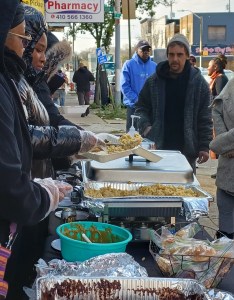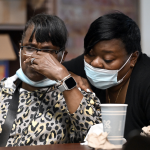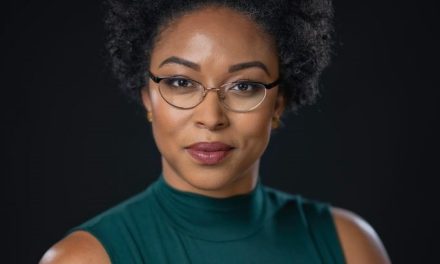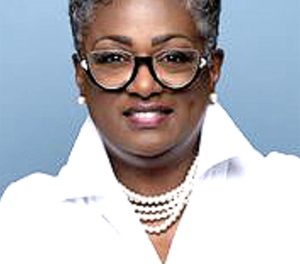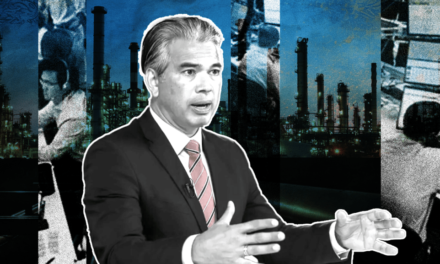
By Catherine Pugh, Special to the AFRO
This week, Vennieth McCormick will do what he has been doing monthly afor almost four years: provide hot meals for as many people as he can, until the food runs out.
On Friday, December 23 the meals will be provided inside of his offices at 2017-19 W. Pratt St. due to weather conditions.
“It is a way to meet people where they are in their addiction,” McCormick.
Some would probably give an arm and a leg to have a plated hot meal, but here there is no requirement to get a three-course meal other than to show up.
McCormick spoke with the AFRO about the personal joy he receives from helping Baltimore residents get their lives back on track.
“I get to hold conversations with about 300 people and ask that simple question — do you want to get clean?” he said.
McCormick knows a lot about the world of addiction. He is the founder, president, and CEO of New Life Recovery, a residential treatment program for addicts. The program has been operating in Baltimore City for nearly four years.

McCormick told the AFRO how he attempts to address what has become a national emergency.
“At New Life Recovery, we believe people can overcome addiction. We’ve seen it with our own clients,” McCormick said. “We run a strict program because they need care and understanding and at the same time our clients learn they must accept responsibility for their treatment in order to break the cycle of drug addiction. Recovery is a journey and we are willing to go the distance with them.”
McCormick believes some residents in need of help just don’t have the willpower or support system to maneuver themselves out of addiction–even when it means living on the street or finding meals in dumpsters and trash cans.
The reasons for addiction vary and the contributing factors are numerous, McCormick explains.
The propulsion into the spiral of drug addiction could be stress, a history of trauma or chronic pain. Some addicted to drugs have lost a loved one, been influenced by peer pressure or have family issues. Others have experienced financial difficulties or are struggling with a mental illness. Experts say addiction impacts the brain and changes behavior.
McCormick said it is hard to profile an addict because they are as different as their race, gender, age, and income levels. He adds that he has even known drug dealers who start out pedaling their products to others on the streets, only to become victims of their own trade. McCormick has seen addicts who use drugs simply to escape their environment, as taking the drug invites them to momentarily escape their surroundings.
“Think about the individuals who go into their doctor or dentist office or have been hospitalized and undergo surgery. are prescribed pain tolerance medication and after the prescription is done, they crave the feeling they experienced while on pain medications such as oxycodone (OxyContin), hydrocodone (Vicodin), codeine, morphine and so many others,” McCormick said.
Those temporary feelings, McCormick notes, can lead to irresponsible behaviors that drive people to act out of their own control.
“People have lost homes, families and end up living in the street all in pursuit of that next high or hiding behind their addiction,” said McCormick.
A complicated fall: the push to hold drug companies, pharmacies and doctors accountable
On any given day in Baltimore, thousands of people are suffering from alcohol and drug addiction and in need of the services McCormick provides. Heroin usage, which has dominated the city since the 1960’s, is being replaced by fentanyl — a deadly trend that also is exploding nationally.
While hundreds of state and local lawsuits have been filed against opioid manufacturers, claiming that manufacturers have engaged in aggressive and misleading marketing of the addictive drugs, the role of physicians in contributing to a national tragedy has received little scrutiny.
In 2021 however, a federal jury in Cleveland found three of the nation’s biggest pharmacy chains, CVS, Walgreens, and Walmart, liable for helping to fuel the opioid crisis in America.
By February 2022 four of the largest U.S. corporations agreed to pay Wisconsin and all other states and territories roughly $26 billion to settle lawsuits related to claims that their business practices helped fuel the deadly opioid crisis in the United States.
Pharmaceutical distributing giants Cardinal, McKesson, and Amerisource agreed to pay $21 billion, while Johnson, and Johnson, who manufactured generic opioid medications, agreed to pay $5 billion.
“Fifty-two states and territories have signed on to the agreement as well as thousands of local governments across the country,” according to information released by the Wisconsin Department of Justice (WDOJ), where the case originated. “All 87 of Wisconsin’s litigating political subdivisions have signed on to the agreement, and Wisconsin will receive its full share of over $400 million.”
In Maryland, Attorney General Brian E. Frosh confirmed that the state was included in the settlement.
“Currently, Maryland stands to receive approximately $395 million from the settlements over 18 years. The funds will be spent on opioid crisis abatement throughout the State,” said Frosh, in a statement released earlier this year.
The settlement was a major win for communities that have been devastated by drug addiction and the crime that comes with it.
“It’s the second largest multistate agreement in U.S. history, the first being the Tobacco Master Settlement Agreement,” said Frosh’s statement.
Johnson and Johnson announced in 2020 that they were getting out of the opioid business altogether.
But the damage has already been done.
“In 2021, the number of fatal overdoses increased by 0.9 percent annually, from 2,799 to 2,823,” according to data released by the Maryland Department of Health’s Opioid Operational Command Center (OOCC).
Fentanyl, specifically, has a stronghold in the state.
“In the 12 months ending in August 2022, fentanyl was involved in 81.1 percent of all fatal overdoses,” the OOCC reports.
Current estimates from the Substance Abuse and Mental Health Administration (SAMHA), a federal agency, indicates that 15.4 percent of all adult Americans struggle with some form of addiction.
In the United States, the Centers for Disease Control and Prevention (CDC) says African Americans have been hit hardest by the opioid epidemic.
“In 2020, overdose death rates, [the] number of drug overdose deaths per 100,000 people, increased 44 percent for Black people and 39 percent for American Indian and Alaska Native (AI/AN) people compared with 2019,” according to the CDC.
The Maryland General Assembly, through Chair of Health and Government Operations Joseline Pena-Melnyk, will introduce legislation to look at creating overdose prevention sites in Maryland during the upcoming legislative session, which begins Jan. 11, 2023 in Annapolis, Md.
The post New Life Recovery: offering a hand to build new lives appeared first on AFRO American Newspapers .

